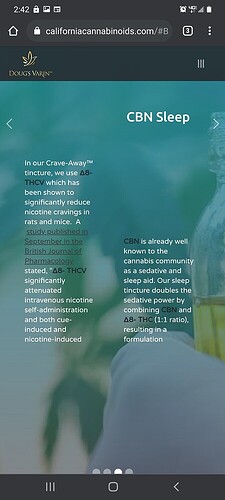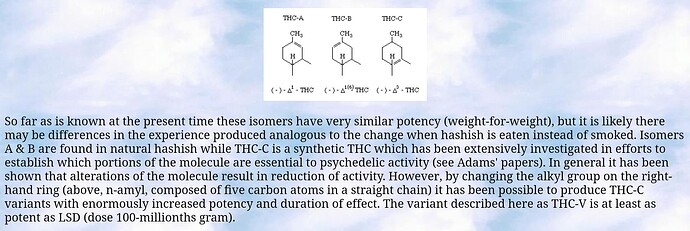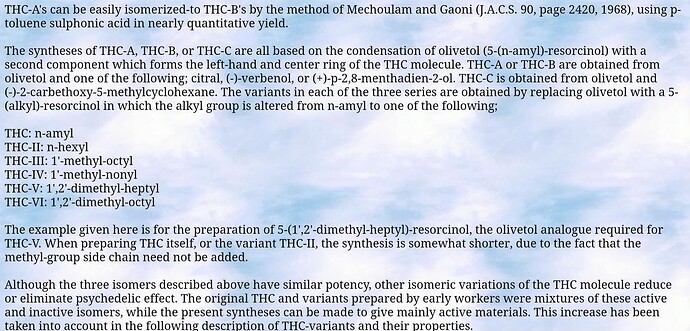I strongly believe that to be the case. Lichens make olivetol however so that can be making semi synthetic thcp. Olivetol has one natural supply from plants.
The natural compound was isolated and fully characterized and its stereochemical configuration was assigned by match with the same compound obtained by a stereoselective synthesis. This new phytocannabinoid has been called (-)-trans -Δ9-tetrahydrocannabiphorol (Δ9-THCP).
This is the only source I’ve found of THCp being a natural occurrence in cannabis sativa.
I think we will find much of what we read in published settings to be questionable if not repeated/proven.
Fake studies. Doctored reports. ChatGPT. A rise in questioning the very things we hold value in, like scientific research… Are up for serious re debate.
Yes. It’s so confusing. You don’t know what is research or hearsay.
I just stinks that consumers can and are ingesting and smoking harmful synths and additives. Even synthetic terps freak me out.
Hold your breath, because the farm bill has had 5 years to watch everyone make new loop holes. This year we see how much they stay.
Wait you mean the internet CAN LIE to me? What do you mean… google told me my searches are trusted and secure…
It’s precisely why i fact check everything now, you could tell me the sky is blue, i infact know it to be blue, I’d still check anyways cause i can’t trust anything on a screen anymore.
Truth
Can’t make THCp with olivetol, you need spheropherol. You can also get olivetol from hemp no problem, you can degrade CBD to olivetol in surprisingly high yield. But I think it doesn’t make sense to do that because any cannabinoid you can synthesize from olivetol you can make in higher yield from CBD. Maybe you can make “hemp derived” (in huge air quotes) THCp or other longer chain analogues by synthesizing the substituted olivetol you need and then condensing it with a terpene you got from hemp.
I don’t know about the rest of the stuff out there, but I had a fucking crazy plant. A Jack Herer x Black Domina called black jack that had 0.5-1% THCv in it over and over and over again. Which meant when we extracted that trim there would be all this THCv in there. I suppose it made it for a better high -shrug-
So I know it can happen, but dang, only that one plant I seen. And I had never grown it before or since.
I probably have Thcb mixed up. The sops I don’t practice.
I think the issue is olivetol was readily available before hemp CBD was and will remain heavily stocked and imported.
I’d go back to hunting it down if you can. Seeing as how nobody else seems to have it proven. Including the big thcv sellers (open book) who bought out a name brand thcv strain (Doug’s varin) that got caught having d8thcv in Cali rec/medical markets. The market is cornered and synthetic. Wild how an east coast Chad brand bought and made Doug’s Varin disappear entirely.
Where’s the thcv strains? Cbdv is even gobbled up before it has a chance. Wonder why.
I believe it to be possible, but knowing how the market has lied and been synthesizing it for years has me to believe it’s cbdv only.
Release the thcv seeds / clones bro. I got 5 on it.
We’ve got thcv in test results too, that doesn’t mean I firmly believe it’s from plant and not extraction process.
Hell, I’ve seen huge thcv peaks. That doesn’t make me a believer.
I wanna see the fuckin plant. Sooo bad!
Damn i smoked that weed before and it looked insane. Gave me a giant headache
Are you saying Doug’s varin was converted material?
100% yessir. Biggest under the rug scam I’ve ever seen imo. You can search my shares of it here previously…
Open books bread and butter.
![]()
![]()
![]() Big if true!
Big if true!
I shared screenshots. They marketed d8thcv in Cali.
I remember Doug’s varin booths at trade shows in the early days. So I really wish this wasn’t true (always rooting for cool shit), but my own research found their d8thcv products.
Just look at RAW. Look at our industry and how low they’ll go to sell you. Shits not from hemp but ships daily from hemp stars.
Thcv is at least from cbdv… Ffs
Towing the line for the big stock market hopes (OBX)
I would crush a shareholders meeting.
Here you go …
Smoking bulleted their website before they sold ![]()
![]()
![]()
![]()
![]()
The alkyl side chain on the resorcinol is what’s being tweaked with with all these analogues, THCv, THCp THCh etc so you can’t start with olivetol for any of them. So none of these compounds could be theoretically derived from “hemp derived” olivetol (or lichen derived olivetol for that matter.) Unless your doing some fancy expensive shit like this: THCp Synthesis - #60 by DJgoDJ
I’ll pull up the sop I recall and edit this.
https://erowid.org/archive/rhodium/chemistry/thc/index.html
Still not sure if this is all of it.
"The syntheses of THC-A, THC-B, or THC-C are all based on the condensation of olivetol (5-(n-amyl)-resorcinol) with a second component which forms the left-hand and center ring of the THC molecule. THC-A or THC-B are obtained from olivetol and one of the following; citral, (-)-verbenol, or (+)-p-2,8-menthadien-2-ol. THC-C is obtained from olivetol and (-)-2-carbethoxy-5-methylcyclohexane. The variants in each of the three series are obtained by replacing olivetol with a 5-(alkyl)-resorcinol in which the alkyl group is altered from n-amyl to one of the following;
THC: n-amyl
THC-II: n-hexyl
THC-III: 1’-methyl-octyl
THC-IV: 1’-methyl-nonyl
THC-V: 1’,2’-dimethyl-heptyl
THC-VI: 1’,2’-dimethyl-octyl
The example given here is for the preparation of 5-(1’,2’-dimethyl-heptyl)-resorcinol, the olivetol analogue required for THC-V. When preparing THC itself, or the variant THC-II, the synthesis is somewhat shorter, due to the fact that the methyl-group side chain need not be added.
Although the three isomers described above have similar potency, other isomeric variations of the THC molecule reduce or eliminate psychedelic effect. The original THC and variants prepared by early workers were mixtures of these active and inactive isomers, while the present syntheses can be made to give mainly active materials. This increase has been taken into account in the following description of THC-variants and their properties."
Yeah this was during my Thc-B research. Correction on P
Thanks. @oscar
Even funnier…
Yeah, citral + olivetol = Thcb
Aka bug guts + lemon flavoring.
My bad thcp fans
I can’t stop laughing from your spoon.
I saved everything.
THCV_-The-Sports-Car-of-Cannabinoids.pdf (50.2 KB)
THCV: The ‘Sports Car’ of Cannabinoids
California Cannabinoids™ is a California Corporation formed in 2017, to provide the cannabis industry
and consumers access to tetrahydrocannabivarin (THCV), a rare but popular cannabinoid known for its
unique properties. They are the exclusive provider of Doug’s Varin™, a line of high THCV products known
around the world to have the highest concentrations of THCV.
More than a decade ago, investigation on THCV was spearheaded by GW Pharmaceuticals who wanted
to research its therapeutic potential in metabolic disorders and weight loss. Metabolic issues can cause
high blood pressure, blood sugar imbalances, increased abdominal fat, and high or low cholesterol.
Since then, animal studies have found that the compound may decrease fat in the liver, balance insulin,
reduce hunger cravings, improve bladder control, and have therapeutic potential for schizophrenia,
Parkinson’s, epilepsy, and nausea reduction. In human trials, THCV has been found to change elements
of brain functioning related to food intake and improve blood sugar control for participants with type 2
diabetes. In laboratory studies, THCV has shown promise in decreasing inflammation, pain, liver damage,
and may be useful as an anti-acne agent.
THCV is a possible novel treatment for obesity-associated glucose intolerance. GW Pharmaceuticals are
studying plant-extracted tetrahydrocannabivarin for type 2 diabetes. It is known as GWP42004, those
with a technical mind should read this THCV research paper which discusses potential uses of THCV for
diabetes. Since diabetes is such a widespread condition, any future potential THCV drugs would have a
very wide application.
This THCV research document looks at the treatment of diabetes with THCV alone, and in combination
with CBD. This THCV statement from GW Pharmaceuticals is interesting reading for those interested in
potential medical uses and applications for THCV.
The research from GW Pharmaceuticals is interesting, but there are no medical promises yet. A lot more
work needs to be done. But all the interest from ‘big pharma’ tells us that the senior pharmaceutical
boffins have a sense of expectation that the cannabinoids have a useful bio-potential. It’s almost as if
they expect to find each new cannabinoid is useful for something. It’s just a question of finding out
what.
THCV has a euphoric mood lift similar to THC. But, at the same time THCV is thought to dampen the
effects of THC. Technically THCV is known as a cannabinoid receptor type 1 antagonist. THCV is also
thought to be appetite suppressing, with roles in the metabolic process and a possible interest as a
diabetes treatment. This Dutch Passion blog on THCV, CBG and CBD is interesting background info on
new cannabinoid research and breeding.
THCV is probably the most sought-after cannabinoid on earth. Industry people call it things like “the
sports car of weed” and “skinny pot,” terms that allude to its effects and rarity.
In 2017, Vice news followed Franco Loja and Arjan Roskam, the founders of the famous Green House
Seed Company, into the Democratic Republic of the Congo as they looked for rare plants that might
produce THCV. A grueling journey brought back a strain that tested at only 1.1 percent THCV—a fairly
tiny amount, but enough for Roskam to say that it was “worth the effort, going into the jungle, fighting
your way through, bribing your way through, in the end you have the reward.” Loja later died after
contracting malaria on a subsequent trip in January 2017.
What about THCV could entice someone to risk death to hunt for it?
It’s not because it will just get you higher. In fact, it appears to create effects that are almost the
opposite of what most people associate with smoking weed. THCV has been shown to be energizing and
appetite suppressing, two traits that make it an obvious candidate for a valuable form of pot. Who in
America doesn’t want to lose weight and get more energy from an herbal drug?
The business appeal of THCV is painfully obvious. GW Pharmaceuticals, the British company that has
used the cover of America’s pot prohibition to go light years ahead of any other single company in
developing pharmaceutical pot medicine, has won a number of American patents for the isolation and
use of THCV as medicine. One of GW Pharmaceuticals patents gives a laundry list of uses for THCV,
including treating obesity, schizophrenia, epilepsy, cognitive disorders such as Alzheimer’s disease, bone
disorders, bulimia, obesity associated with type II diabetes, and drug, alcohol, or nicotine abuse or
dependency.
GW Pharmaceuticals has yet to publicly release any THCV, and it is exceptionally hard to find in any
significant quantities on the recreational cannabis market. The highest THCV result in the 2014 High
Times cup in Seattle was only 1 percent THCV. Even in the concentrate category that year, THCV tested
up to only 2 percent.
I called and e-mailed every pot grower, breeder, and retail buyer I knew in the state, and I still couldn’t
find anything that could beat these percentages. The most fruitful result was from Western Cultured,
the Bellevue farm that grows the best lemon haze on the market. Western Cultured is helmed by
Brianna Hughes, who told me that most of their strains test at a minimal THCV level, but their Dutch
Treat can run higher thanks to “a special genetic line we’ve kept since 2012 in the medical cannabis
days.”
“Most of our strains have trace—less than 0.2% THCV, but our Dutch Treat runs around 1.0 to 1.4%,”
Hughes wrote in an e-mail.
She had just cut down a new batch of Dutch Treat and sent it out for testing. A few days later, she
e-mailed me back with the results. That latest batch was at 1.31 percent, right within Hughes’s expected
range.
That is an impressive result—remember Loja and Roskam were able to get only 1 percent from heirloom
pot they had scoured the Congo for—but it is probably not enough to elicit those diamond-studded
effects. There’s some evidence that THCV behaves in very different ways depending on how large of a
dose we give our bodies. At a low dose, it might be only a fraction as psychoactive as its common cousin THC. But at a high dose, it turns into the appetite suppressing, stimulating sports car of a drug that
everyone wants to get their hands on.
And there are strains with high levels of THCV. Just nothing that’s for sale in Washington State, it seems.
Eventually I got ahold of someone who actually has a lot of THCV. Kymron deCesare, the chief research
officer for Steep Hill Labs in Tukwila, is one of the few people in the United States to have a legitimate
supply of THCV.
“For more than a year and a half, I have been sitting on six pounds of plant matter that I know for a fact
contains 200 to 250 grams of THCV,” deCesare told me over the phone. “I have not extracted that yet
because I am not going to consider touching it until I have exactly the right extraction equipment so
nothing gets gooped up. It’s so valuable, I cannot afford to make a mistake.”
How did deCesare come into possession of more than 200 grams of the most sought after cannabinoid
on earth? Mostly by accident. A California medical farmer, who goes simply by Doug, sent deCesare a
sample of flower he thought was from a Harlequin strain, which is supposed to be high in CBD. But
deCesare’s testing showed something very different: The flowers came back with a remarkably high
amount of THCV. In light of this discovery, deCesare named the strain “Doug’s Varin,” after the farmer,
and has continued to work on refining the strain’s THCV content, according to an interview “Doug” gave
to a trade journal published in 2015.
Will Doug’s Varin soon be on the shelves of retails stores across America? Probably not, as deCesare said
he couldn’t comment on Steep Hill’s plans for the strain, although he did indicate the company is
actively researching it.
Any seasoned hunter will tell you that not all hunting trips return any game, and so it went with my
search for some tetrahydrocannabivarin I could try, the so-called “sports car” of pot. That doesn’t mean
we should stop keeping an eye out for these rare cannabinoids. We are still in the early stages of
rigorous research on all that pot has to offer.
One of the most promising aspects of this research is the spread of professional cannabis testing labs
across the country. The industry now has scientists at its disposal for testing for rare cannabinoids.
Jeffrey Raber, founder of the cannabis lab the Werc Shop, said it is “exceptionally nominal” to test for
cannabinoids beyond just THC and CBD, and added that exploring these other compounds might be a
way for companies to set themselves apart in the industry.
“If I’m a cultivator that feels pressure because everyone is doing the same thing I am doing, then do
something else,” Raber said. “If you’re the first with something new like that, it can be really beneficial to that group and solidify your place in the marketplace.”
That article on erowid has very outdated terminology. When you said THCb I thought you were referring to tetrahydrocannabutol which would require the butyl-resorcinol, not olivetol. That article is talking about 3 different isomers of THC itself.
Here they call ‘THC-B’ D(1)(6)-THC which if I’m not mistaken is Delta-8! Which makes sense because later in the article they say THC-B can be synthesized from THC-A with pTSA and cite Mechoulam. They go on to explain that what the author terms ‘THC-C analogues’ require a substituted olivetol.





